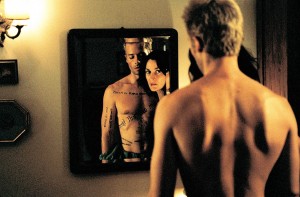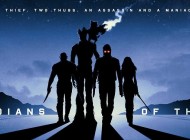Before Batman Rises, a MEMENTO from Nolan
 “I have to believe in a world outside my own mind. I have to believe that my actions still have meaning, even if I can’t remember them. I have to believe that when my eyes are closed, the world’s still there.“
“I have to believe in a world outside my own mind. I have to believe that my actions still have meaning, even if I can’t remember them. I have to believe that when my eyes are closed, the world’s still there.“
I found this review in the vault (and plan to feature it in my upcoming book “Cinemagogue: reclaiming entertainment and navigating narrative for the myths and mirrors they were meant to be”). Since Christopher Nolan is about to give us what may be the final and definitive word on Batman in July, it’s worth looking at one of the film’s that gave him his following, and notable prestige, something a bit closer to the inception of his remarkable directorial career.
MEMENTO
starring Guy Pearce
and Carrie Anne-Moss
directed by Christopher Nolan
Before rattling our cages with the Batman trilogy, director Christopher Nolan gave us the story of Leonard Shelby (Guy Pearce), a man with a desperate mission and medical condition, single-mindedly pursuing his wife’s killer (and the man who injured him). However, his head trauma has resulted in a unique predicament; Lenny has no short-term memory. He retains all his knowledge and life-experience prior to the accident but people, places, and events he encounters after the accident he cannot create lasting memories for. People he met yesterday (or fifteen minutes earlier) are strangers to him. If a conversation lasts more than twenty minutes, he won’t remember how it started… or whom he’s talking to. We are thrust into his world… the first ten minutes of the film are actually the ending, as we—with Leonard—examine the surroundings and situation, then watch him act quickly and accordingly with his understanding of persons and events. The film then moves backward, in segments of similar length… methodically unveiling how, and why, the opening climax occurred.
“Facts, not memories. That’s how you investigate.”
 Leonard places faith in tangible items or written “facts”. Memory, he affirms, isn’t reliable anyway. He takes Polaroids of people he encounters, his car, the hotel where he is staying… jotting quick notes on the back to inform him later as to who or what they are, how they relate to him, and how he should deal with them. He tattoos his body with the most basic “truths” and carries a folder of information—map, sticky notes, police reports—for easy reference. Without direct observation, he’s forced to repeatedly reinterpret this “historical record” in light of current circumstance, instinct, emotion, and quickly formed yet untested presupposition.
Leonard places faith in tangible items or written “facts”. Memory, he affirms, isn’t reliable anyway. He takes Polaroids of people he encounters, his car, the hotel where he is staying… jotting quick notes on the back to inform him later as to who or what they are, how they relate to him, and how he should deal with them. He tattoos his body with the most basic “truths” and carries a folder of information—map, sticky notes, police reports—for easy reference. Without direct observation, he’s forced to repeatedly reinterpret this “historical record” in light of current circumstance, instinct, emotion, and quickly formed yet untested presupposition.
Leonard is revisionist history in microcosm, representing how we generationally reexamine people and events by our popular culture’s ever-shifting, subjective, sociopolitical view. As we see how Leonard’s “written records” are originally formed, the reasons why he wrote them, why he tattooed each “fact”, reality comes into question. People aware of his condition manipulate what he sees and hears, so his future record is affected. His system can only work if every perception is inerrant, and Leonard is mortal and finite. But… is he truly to be pitied?
“The heart is deceitful above all things, and desperately sick; who can understand it?” – Jeremiah 17:9
 As the film reaches the end—the beginning—something even more insidious is revealed; historical material can only be interpreted accurately if the interpreter is without bias. Is Leonard honestly seeking to uncover truth, to solve the mystery, to find the man who murdered his wife, or is he—like G.K. Chesterton’s madman in the book Orthodoxy—simply defining an ever-tightening circular reality out of his own basic, intrinsic need for “purpose”? Leonard imposes his own agenda onto the material and conforms its revelations to his own desires. Moreover, the foundation for his existence is his memory PRIOR to the accident… and Leonard himself states that “memory is unreliable”. Is he free, then, from self-delusion in this area? Another character accuses Leonard of this:
As the film reaches the end—the beginning—something even more insidious is revealed; historical material can only be interpreted accurately if the interpreter is without bias. Is Leonard honestly seeking to uncover truth, to solve the mystery, to find the man who murdered his wife, or is he—like G.K. Chesterton’s madman in the book Orthodoxy—simply defining an ever-tightening circular reality out of his own basic, intrinsic need for “purpose”? Leonard imposes his own agenda onto the material and conforms its revelations to his own desires. Moreover, the foundation for his existence is his memory PRIOR to the accident… and Leonard himself states that “memory is unreliable”. Is he free, then, from self-delusion in this area? Another character accuses Leonard of this:
“Maybe it’s time you started investigating yourself… You don’t want the truth. You make up your own truth.”
Grasping any real truth in a tainted world of confusion and deceit, using his own limited senses and tainted motivations, is forever beyond Leonard’s grasp… and the same is true of us. Without a personal, transcendent intercessor that can see objectively and speak into our lives, we are… like Leonard… utterly lost. At best, we are simply constructing a plausible reality structure to keep us temporally sated in this life under the sun. Like Leonard says, “we all lie to ourselves to be happy.”
 “…they exchanged the truth about God for a lie and worshiped and served the creature rather than the Creator” – Romans 1:25
“…they exchanged the truth about God for a lie and worshiped and served the creature rather than the Creator” – Romans 1:25
Unless God intersects our lives, we are all like Leonard: driving blind—or with faulty, self-constructed roadmaps—down a broad path to destruction. Heaven help us if nothing intercedes to show us truth.
“For now we see in a mirror dimly, but then face to face. Now I know in part; then I shall know fully, even as I have been fully known.” – 1 Corinthians 13:12
Questions for Contemplation and Discussion:
- Do we define and arrange others in ways that simply fit them in our own “reality”?
- Is there any way we can know anything, truly knowing ourselves and others?
- Do we really want to live in light of truth, or simply our own comfortable “truth”?
- How is using the Bible any different than Leonard’s folder, notes and tattoos?
- Does the gospel offer a way to reconcile these things and pull us out of this cycle?



